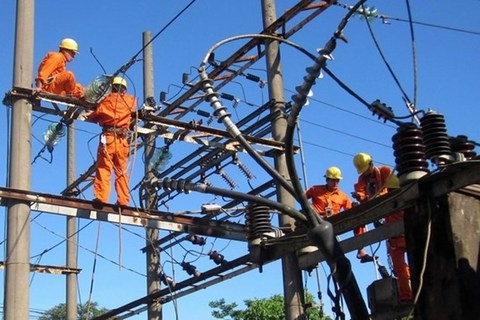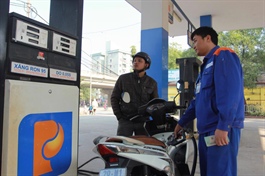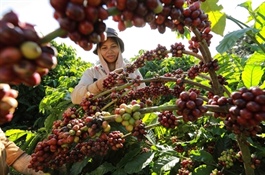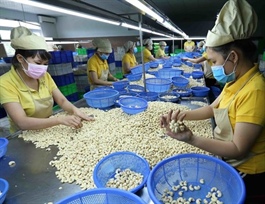Electricity price hike leaves minimal impact in short term: Ministry
Electricity price hike leaves minimal impact in short term: Ministry
The recent electricity retail hike of 3 per cent will likely have a small effect on the country's CPI in the short run, according to the Ministry of Finance.

EVN workers perform maintenance on an electrical grid in the Mekong Delta. — VNA/VNS Photo |
The impact on the cost of production for industries that use a lot of electricity such as steel, cement and paper may increase by 0.18 per cent, 0.45 per cent and 0.4 per cent, respectively, said the ministry.
According to EVN, the group supplied electricity to more than 528,000 service providers across the country. On average, each paid around VND5.3 million per month. After the price hike, each is expected to pay an additional VND141,000 monthly.
Likewise, more than 1.8 million goods producers, whose average electricity cost was VND10.6 million, are expected to pay an additional VND307,000 monthly.
On the other hand, according to stock company Mirae Asset, electricity accounts for about 3.5 per cent of the total basket of CPI calculation. Therefore, if electricity increases by 3 per cent, it directly increases CPI by 0.105 per cent, while if it increases by 5 per cent, CPI will increase by 0.175 per cent.
In the short term, a small price hike will not likely have a large impact on major industries as electricity producers often signed long-term contracts with Vietnam Electricity (EVN), with some as long as 25 years.
Distributors also benefit, in general, from price hikes as they can now sell electricity at a higher price than long-term contracts, which were negotiated at lower price points.
According to Mirae Asset, electricity costs account for about 9-10 per cent of the cost of goods sold in steel and chemical production, 14-15 per cent in cement production, except for producers with rotary kilns where electricity costs account for about 9-10 per cent, and 4-5 per cent for paper production.
In the worst-case scenario for producers in which they cannot raise their prices, their profit before tax will decrease by as much as 15 per cent for steel, 13 per cent for cement, 2 per cent for paper and 1 per cent for chemical producers.
However, it's likely producers will raise their prices to lessen the impact on their bottom lines. In that case, consumers will bear part of the increased input cost.
In the long term, a more flexible pricing system will allow greater competition and a more balanced supply and demand relationship in the market.
Nguyen Tien Thoa, president of the Vietnam Valuation Association, said considering how much input cost for electricity production increased by 9.27 per cent from 2021 to 2022, a 3 per cent price hike could be viewed as moderate, and could not make up for the rise in input cost.
Thoa said it was in the public's interest to see electricity price increase gradually, within a determined timeline, to ensure socio-economic stability and the rights and interests of both businesses and consumers.
He said the decision to raise the price right before summer might have a small to moderate impact on consumer's bills, especially for households that consume a lot of electricity. Consumers typically consume twice as much electricity during the summer months, largely due to the constant use of air conditioners.
However, the ideal solution would be to have households economise the use of electricity, which is in line with the government's recommendation to conserve energy and reduce CO2 emissions.
Thoa said a 3 per cent price hike in electricity might result in as much as a 1.099 per cent rise in CPI in the short term and a 1.28 per cent rise in the long term.
However, it also depended on the market's tolerance to increased commodity prices, the effectiveness of the government's price stabilisation efforts and cost-cutting measures taken by goods and services producers.
He stressed the importance for the central government to publicise regularly all information related to electricity prices in a timely manner to prevent businesses from taking advantage of the situation to raise their prices disproportionately.
According to Nguyen Manh Hung, chairman of the Vietnam Consumer Protection Association, electricity is considered a special commodity in the sense that it's often most beneficial to maintain a balance between production and consumption at all times as it's nearly impossible to store electricity at a low cost.
Demand for electricity has been on the rise in recent decades in Viet Nam, and will likely continue in the future. Meanwhile, the resources to keep producing electricity are not unlimited. Therefore, according to Hung, it's a key priority for the government to direct industries and general consumers to conserve and economise the use of electricity.
"While Viet Nam's per capita electricity demand is still low compared to developed countries it has increased every year during the last several decades," he said.
He added that ensuring a stable electricity supply for the country's economy and people would likely be a growing challenge in the near future.
The emphasis should be on industrial sectors as they consume from 80 per cent to 85 per cent of the national output, with household usage accounting for the rest.






















